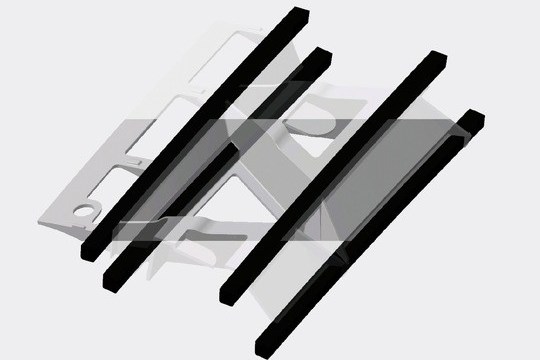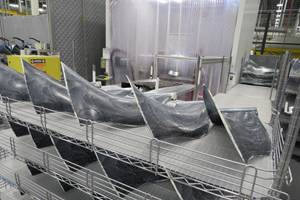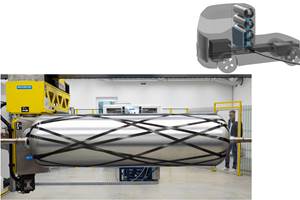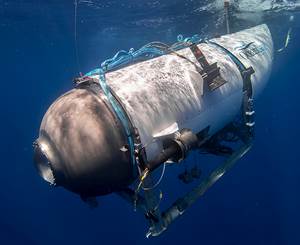SGL Carbon, Koller Kunststofftechnik manufacture composite windshield
Injection molded carbon fiber profiles for future BMW Group models cut 40% of weight compared to conventional steel construction and offer potential use in other automotive projects.

Skeletal windshield design. Photo Credit: SGL Carbon
In August 2020, SGL Carbon (Wiesbaden, Germany) received a multi-year order from Koller Kunststofftechnik GmbH (Lupburg, Germany) for the production of novel carbon fiber profiles for serial use in windshields, which will be applied in a high-volume model of BMW Group (Munich, Germany) within the next few years.
According to SGL Carbon, the profiles are composed from flexible fiber tows, pre-impregnated with thermoplastic resin in various dimensions. They will be compiled by SGL Carbon on the basis of its own 50K carbon fiber at its site in Innkreis, Austria, and subsequently processed by the injection molding experts at Koller to form a skeletal plastic component (More on this design with “Skeleton design enables more competitive composite autostructures” and “More details on MAI Skelett design process”). The composite component will reportedly replace the previous steel-based windshield. Production of the carbon fiber profiles will start in the remainder of 2020 and will then be ramped up gradually over the next few years for the BMW Group model launch.
As a vehicle’s windshield typically has an important stabilizing function, says SGL Carbon, the carbon fiber profiles add the required stiffness and crash safety to the component. At the same time, they are said to significantly reduce the weight of the roof and also support the driving dynamics. The injection molding process also enables particularly complex and material-efficient structures. In the BMW Group model, this innovative component concept will cut weight by 40% compared to conventional steel designs of the component, while creating important space for cable ducts and sensors.
SGL Carbon adds that the production of the carbon fiber profiles themselves is also particularly geared to material and process efficiency in large-scale production. The profiles consist of several smaller fiber strands — called “rods” — and are manufactured using the modern continuous pultrusion process. During product and process development it was one key objective to ensure that material loss during production was almost completely avoided.
"At SGL Carbon, we have been working on the development of thermoplastic carbon fiber profiles for use in injection molding for some time already. This developmental work is now beginning to pay off. Due to the many advantages and competitive costs, we see a great potential for the technology to be used in other automotive projects too," explains Sebastian Grasser, head of the Automotive Segment in the Business Unit Composites – Fibers and Materials at SGL Carbon.
"Innovative lightweight construction with hybrid designs has developed into a strategically conclusive concept for Koller Group's OEM customers," confirms Max Koller, CEO of Koller Group. "SGL Carbon's high level of material expertise, combined with the process know-how of Koller Kunststofftechnik and Koller Formenbau, create the basis for a promising future in innovative lightweight construction technologies. With this order, the BMW Group has confirmed its confidence in the successful cooperation between SGL and Koller; we are particularly pleased about this,” he adds.
The Koller Group is a globally operating technology company with plants in Europe and China, as well as NAFTA. The Koller Group develops and manufactures lightweight construction, tools and serial components, primarily for the automotive industry.
Related Content
Plant tour: Albany Engineered Composites, Rochester, N.H., U.S.
Efficient, high-quality, well-controlled composites manufacturing at volume is the mantra for this 3D weaving specialist.
Read MorePlant tour: Joby Aviation, Marina, Calif., U.S.
As the advanced air mobility market begins to take shape, market leader Joby Aviation works to industrialize composites manufacturing for its first-generation, composites-intensive, all-electric air taxi.
Read MoreCryo-compressed hydrogen, the best solution for storage and refueling stations?
Cryomotive’s CRYOGAS solution claims the highest storage density, lowest refueling cost and widest operating range without H2 losses while using one-fifth the carbon fiber required in compressed gas tanks.
Read MoreThe lessons behind OceanGate
Carbon fiber composites faced much criticism in the wake of the OceanGate submersible accident. CW’s publisher Jeff Sloan explains that it’s not that simple.
Read MoreRead Next
Plant tour: Daher Shap’in TechCenter and composites production plant, Saint-Aignan-de-Grandlieu, France
Co-located R&D and production advance OOA thermosets, thermoplastics, welding, recycling and digital technologies for faster processing and certification of lighter, more sustainable composites.
Read MoreDeveloping bonded composite repair for ships, offshore units
Bureau Veritas and industry partners issue guidelines and pave the way for certification via StrengthBond Offshore project.
Read MoreVIDEO: High-volume processing for fiberglass components
Cannon Ergos, a company specializing in high-ton presses and equipment for composites fabrication and plastics processing, displayed automotive and industrial components at CAMX 2024.
Read More
























